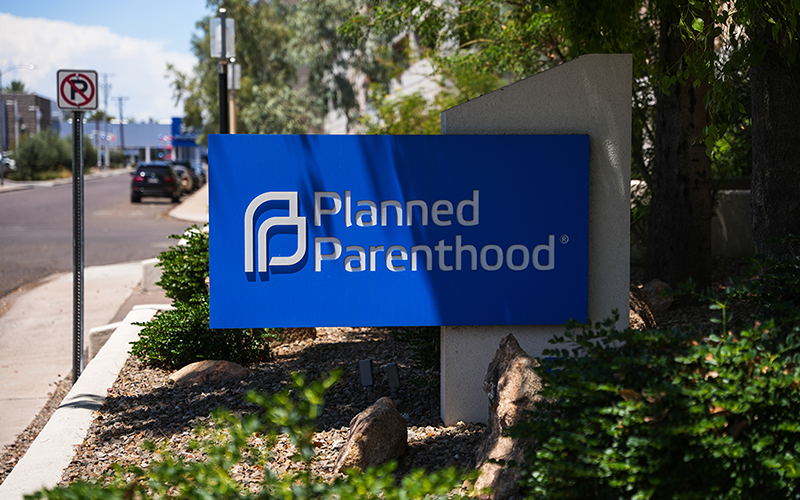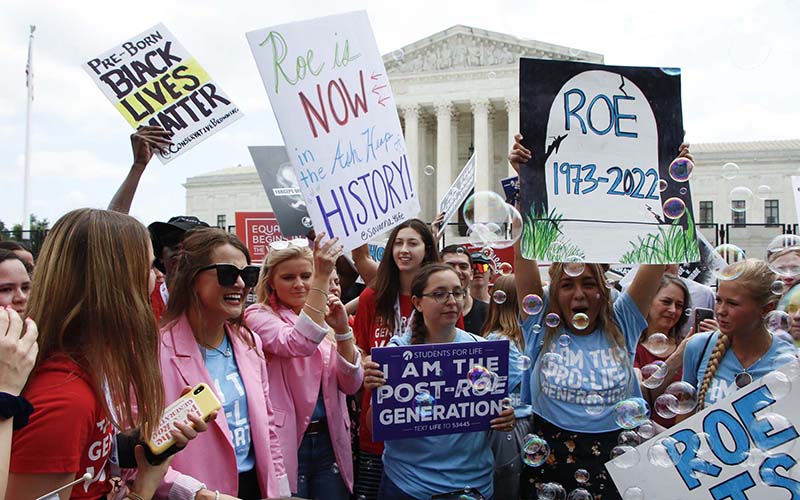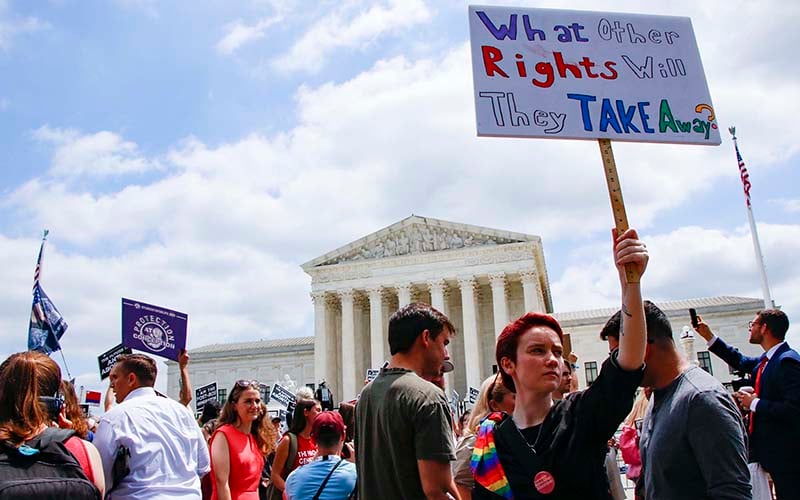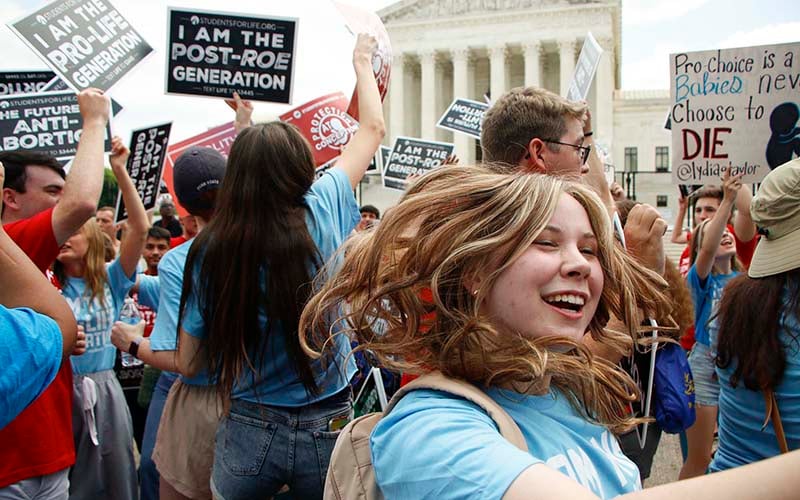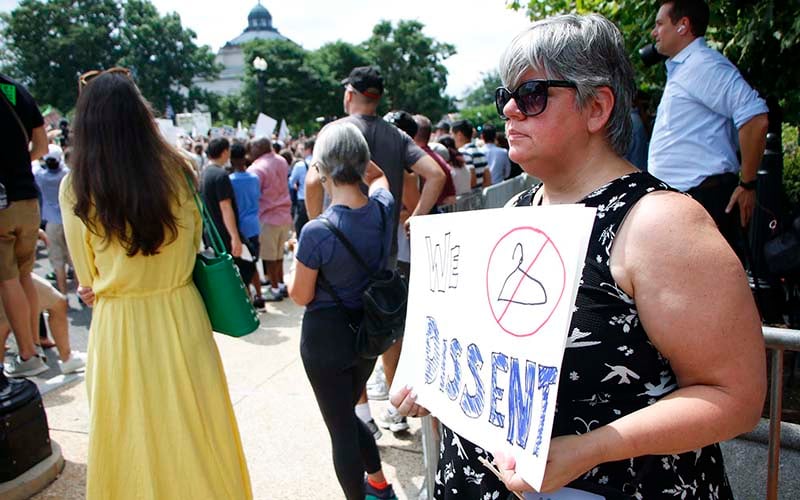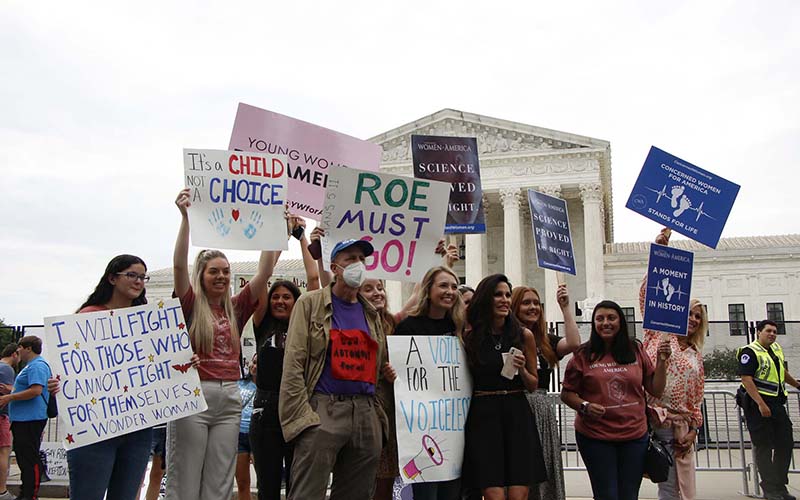WASHINGTON – The Supreme Court ruled Friday that there is no constitutional right to an abortion in the U.S., overturning nearly 50 years of precedence and returning the power to regulate abortions to the states.
In Arizona – where Planned Parenthood said it will suspend abortion services and the attorney general said a new, more restrictive abortion law can now take effect – reaction was swift, and ranged from advocates being “furious” to calling it “a great day.”
While the Republican Party of Arizona hailed the “monumental day for the protection of life in America and a defining moment for our nation,” the chair of the Arizona Democratic Party called the ruling “horrific news.”
“Right now Arizonans are going through periods of anger, sadness, and frustration, in response to this brutal attack on our freedoms,” said a statement from Raquel Terán, the Democratic Party chair.
Outside the court, the hundreds of antiabortion protesters who had been gathering erupted in cheers, while abortion-rights advocates reacted with tears and anger.
“It’s the most joy I’ve ever felt,” said Savanna Deretich, public relations and policy coordinator for Students for Life of America, “Now, we can protect people from womb to tomb.”
As antiabortion groups danced, sang, blew bubbles and took selfies, the responses from abortion advocates went from being stunned to anger to sorrow. They protested the decision, chanting, “Supreme Court does not work for us” and “no justice, no peace.”
Kaitlyn, 17, a Chandler resident who declined to give her last name, said it was an emotional moment.
“I knew it was important to me, I didn’t know how important it was,” said Kaitlyn, in Washington for a summer program. “It truly is a right they are taking from us and I think things need to change, I think the courts need to change.”
Crowds had gathered for several days in recent weeks, as the court’s term was winding down and advocates knew a decision on the abortion case was imminent.
The scene Friday was loud but relatively peaceful, as a heavy contingent of Capitol, court and city police were on hand to keep the two sides apart for the highly charged issue. The court itself has been ringed with security fencing since May, when a leaked draft of Friday’s ruling led to protests outside justices homes and, in one case, a threat against Justice Brett Kavanaugh’s life.
The ruling in Dobbs v. Jackson Women’s Health dealt with a Mississippi law that bans abortions after 15 weeks – about 10 weeks earlier than was previously allowed in Roe and a follow-up case, Casey.
But Justice Samuel Alito, writing for a 6-3 majority, took the opportunity to say both Roe and Casey were wrong, and that the Mississippi law could stand.
“The Constitution makes no reference to abortion, and no such right is implicitly protected by and constitutional provision,” wrote Alito, who said Roe “was egregiously wrong from the start.”
“It is time to heed the Constitution and return the issue of abortion to the people’s elected representatives,” he wrote.
But in their joint dissent, Justices Stephen Breyer, Elena Kagan and Sonia Sotomayor, said not only that the majority was wrong, but that its decision flouted the concept that judicial precedent should only be overruled in extreme situations. They said the ruling “has wrenched this choice from women and given it to the States.”
“Whatever the exact scope of the coming laws, one result of today’s decision is certain: the curtailment of women’s rights, and of their status as free and equal citizens,” the justices wrote. “With sorrow – for this court, but more, for the many millions of American women who have today lost a fundamental constitutional protection – we dissent.”
The fight now moves to the states and their “elected representatives where it belongs,” Arizona Attorney General Mark Brnovich said in a statement Friday.
Arizona passed a law in March that mirrors the Mississippi law, banning abortion after 15 weeks of pregnancy except in the case of a medical emergency for the mother. Like the Mississippi law, there is no exception for victims of rape or incest. Brnovich said that law will now go into effect in about 90 days.
But state Senate Republicans said Friday that a 1901 territorial law that banned virtually all elections is now in effect, and will remain so until the 15-week-ban takes effect some time this fall.
And while the Guttmacher Institute has identified Arizona as one of 22 states where an old abortion ban can take effect automatically if Roe is overruled, other abortion-rights advocates have said that the 1901 ban was enjoined by a court in 1973 and cannot take effect until the injunction is lifted.
It was the “tangled web of conflicting laws” that led Planned Parenthood Arizona to announce Friday that it would “pause our abortion care in this moment, because of the lack of clarity in the legal landscape right now.”
In their dissent, Breyer, Sotomayor and Kagan said that, “Whatever the exact scope of the coming laws, one result of today’s decision is certain: the curtailment of women’s rights, and of their status as free and equal citizens.”
Rep. Ruben Gallego, D-Phoenix, who briefly joined the protesters outside the court, called it a “shame” that people’s reproductive rights are being taken away from them. He said Congress should “codify Roe v. Wade, break the filibuster to protect women’s rights.”
Rep. Tom O’Halleran, D-Sedona, said in a statement that he was “furious, disappointed, crestfallen” over the ruling that he said interferes in a decision that should be made by a woman and her doctor.
“This decision goes back on half a century of legal precedent; it is a mammoth setback for women, families, and our entire nation,” he said.
But Rep. Debbie Lesko, R-Peoria, welcomed the overturning of Roe as the “right decision.”
“Now, more than ever, it is time for us to unite to support vulnerable women and their unborn babies,” Lesko said in a statement.
Outside the court Friday, Katie Benton-Cohen, a Tempe native who now lives in Washington, said the Dobbs ruling will not end the debate, nor will it end abortion in the U.S. But it likely make it harder for low-income and women of color to get an abortion if they need one, she said.
“The reality is that there are plenty of women in the U.S. who’ll continue to have access to abortion,” said Benton-Cohen, a history professor at Georgetown University. “But this is the most unbelievably discriminatory day that violates the very idea of equality.”
-Cronkite News reporter Daisy Gonzalez-Perez contributed to this story in Washington.

